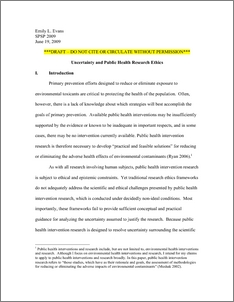Evans, Emily
(2009)
Uncertainty and Public Health Research Ethics.
In: UNSPECIFIED.
![[img]](https://philsci-archive.pitt.edu/style/images/fileicons/application_pdf.png)  Preview |
|
PDF
EEvans_Uncertainty_and_Public_Health_Research_Ethics.pdf
Download (249kB)
|
Abstract
Uncertainty is a necessary condition for the sound moral and scientific conduct of research involving human subjects. If the expert scientific communities, medical or otherwise, lacked uncertainty about the interventions under investigation, it would be unethical to knowingly subject individuals to inferior or harmful treatment. Moreover, if the relative merits of the interventions were previously established, as indicated by the lack of uncertainty within the relevant expert community, the results of the trial would be of little, if any, scientific value. Despite the important role that uncertainty plays in the formulation and conduct of research involving human subjects, the concept has received inadequate treatment in the research ethics literature. To the limited extent that uncertainty is addressed, much of the emphasis remains on the ethical, not epistemic, aspects of uncertainty. What is left insufficiently examined is the nature and scope of the uncertainty. Often, uncertainty is glossed as agnosticism, indifference, and conflict. Yet these terms represent distinct types of uncertainty, and the type that obtains impacts the epistemic and ethical justifications for a proposed trial. A failure to recognize and clearly articulate the parameters of uncertainty in particular situations compromises our ability to respond to important moral and scientific concerns in the development and conduct of research. This problem is particularly pronounced in public health research that investigates problems resulting not only from uncertainties in scientific knowledge but from institutional failures, economic and social constraints, and lack of political will. Indeed, the role of research in public health is tied to its capacities to successfully navigate such complex questions. The way in which a study is designed and carried out, as well as ethically and scientifically justified, must reflect a robust and systematic characterization of the uncertainties present. Using an example from a study examining the efficacy of using treated sewage sludgeto remediate lead-contaminated soil, I explore and analyze the aforementioned deficiencies in understanding uncertainty among researchers and ethicists. The case study serves as a vehicle through which to illustrate (1) important considerations in characterizing and addressing uncertainty; (2) the influence of the uncertainty characterization on the formulation of parameters used to evaluate the ethical permissibility of the research; and (3) ways in which these parameters might be operationalized in the context of a particular study.
Monthly Views for the past 3 years
Monthly Downloads for the past 3 years
Plum Analytics
Actions (login required)
 |
View Item |



